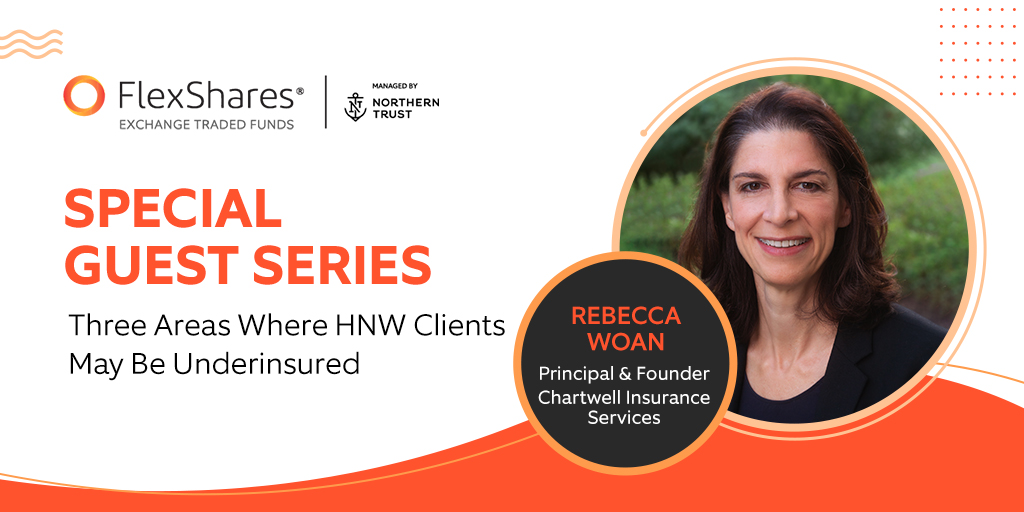Risk management isn’t just about investment portfolios – 3 areas where HNW clients may be exposed.
This Special Guest post focuses on risk management through property and casualty insurance for high-net-worth families. Our guest blogger, Rebecca Woan, is a principal and founder of Chartwell Insurance Services. Rebecca joined us recently on an episode of The Flexible Advisor podcast and discussed areas where she sees clients at risk because they are under-insured or have assets improperly titled. In this blog she shares a few of those common oversights. Listen to the podcast episode for a more in-depth conversation on the topic.
High-net-worth clients respond positively when their advisor thinks holistically about them. And clients increasingly expect their advisor to offer more than just investments. In our two decades of experience at Chartwell Insurance Services we have observed that the most successful advisors are the ones who go beyond investment management and retirement planning. One important way to do that is by offering clients a comprehensive review of their personal insurance risks. It’s not uncommon for HNW individuals to be underinsured without realizing it. Here are three talking points to start the conversation with your clients:
- Umbrella limits. Umbrella coverage is an area of particular concern. It’s not uncommon to see a family that has a net worth of $10 million or more and umbrella coverage of just $1-$2 million – and sometimes none at all! A good rule of thumb is for HNW clients to have at least $10 million in excess liability. And, if their net worth at risk in a lawsuit is much higher than $10 million they should consider higher limits. Limits are typically available up to $100 million from insurance companies who specialize in this market segment. Umbrella coverage from these companies can also include uninsured motorist coverage in addition to the coverage available on the automobile policy.
“When an adult child causes an accident, their parents could be dragged into a lawsuit, especially when a plaintiff's attorney learns that the car driven by the defendant is titled in the name of someone who has a very “deep pocket.”
- Vehicles given to adult children titled in the parent’s name. Parents may believe they are helping their children by keeping them on the family insurance policy. However, when an adult child causes an accident, their parents could be dragged into a lawsuit, especially when a plaintiff's attorney learns that the car driven by the defendant is titled in the name of someone who has a very “deep pocket.” A better approach is to transfer the title of the car to the adult child who can insure the car in their name. Adult children living on their own and insured on the family policy are technically covered only to drive the cars on the family policy. Many people don’t realize that rented and borrowed vehicle coverage is only available to household members and that adult children living away are no longer eligible for this coverage. Parents can continue to provide assistance by paying the insurance premium and in this way, avoid being liable for accidents caused by their adult children.
- Be sure that trusts and LLCs are listed on the insurance policy. We see many residences that are titled in the name of a trust or LLCs yet not included as additional insureds on the related insurance policy. This creates problems in a claim situation as the claim check will be made payable to the policyholders if there are no additional insureds. This moves assets outside of the trust.
There are of course many more potential insurance needs your clients may have that may not be top of mind for them – or you. For those advisors that are not also insurance agents, we suggest seeking to find a property and casualty insurance professional to assist your clients. They can help you with more questions to ask and help you better provide a holistic wealth management approach for your clients. When seeking this expertise look for:
- Experience in the high net worth market which is distinct from the middle market.
- Personality – someone who is a good fit with you and with your clients
- Licensing – be certain this professional is licensed in the states where your clients have residences
- Market access. Do they have direct appointments with large and trusted insurance carriers? If so, they don’t work through a wholesaler and they have access to the underwriters. Visit the insurance company website to identify their appointed agents.
Risk management goes far beyond the investment portfolio. To provide a truly holistic experience for your clients, understanding how to manage their risk through property and casualty insurance is also an important consideration.
